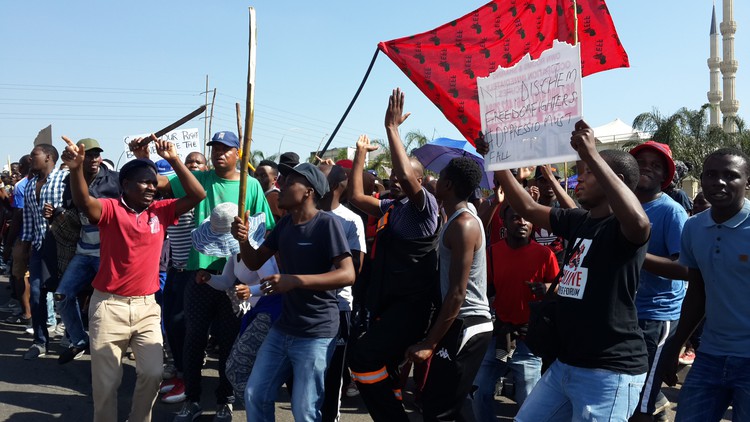Dis-Chem accused of victimising union members
Workers on strike at retailer’s warehouse
Members of the National Union of Public Service and Allied Workers (NUPSAW) are on strike at Dis-Chem warehouse in Midrand, Johannesburg. The workers demand that management recognise the trade union and pay bonuses to union members which they say have been unjustly withheld.
In a memorandum on 15 January management said that a “no work, no pay” policy would apply to workers participating in the protest.
The strike follows a dispute over organisational rights which was referred to the Commission for Conciliation, Mediation and Arbitration (CCMA) at the beginning of November. The CCMA issued a certificate on 14 December stating that it had failed to resolve the dispute and that the union could proceed to a strike.
Dis-Chem management responded to the strike threat by withholding bonuses from warehouse workers. In a notice put up in the warehouse, management said it had been notified on 10 January of strike action on 17 January. “No bonuses were paid to warehouse staff last year because of serious rumours of a general strike”, management said. However, Dis-Chem said, the company had “no intention of penalising all staff anymore” and all employees who were “not represented by NUPSAW and did not participate in the strike” would get their bonuses on 15 January 2018.
According to Solly Malema, NUPSAW National Organiser, no union member has been paid their bonuses to date.
Asked by GroundUp for comment on the withholding of bonuses to employees who belong to a union, Onkgopotse Maditse, Head of Communications at the CCMA, said the facts in the case had not been confirmed and the CCMA could not comment.
A warehouse employee who asked to remain anonymous said the dispute between workers and Dis-Chem management started when the workers, with the help of an organisation called Casual Workers Advice Office, referred disputes with Dis-Chem about temporary workers becoming permanent to the CCMA.
Ighsaan Schroeder, Media Liaison at the advice office, told GroundUp that 21 disputes had been referred to the CCMA, which culminated in 822 workers being made permanent in 2017.
However the warehouse employee said Dis-Chem had then changed the terms of the workers’ contracts.
“They added an extra half an hour to our working day. Our salary decreased by almost half. We had compulsory over time. We were transferred from any department at any time. It’s like they were punishing us for taking them to the CCMA,” he said.
Malema told GroundUp that the union currently represents about 1,200 Dis-Chem workers.
He said the South African Commercial, Catering and Allied Workers Union is the only other union operating in Dis-Chem but NUPSAW is the majority union.
“It’s very important for the union to be recognised because it’s the first step to negotiating salaries, hours and improving the working conditions of the workers”, said Malema.
In a statement released on 18 January, Dis-Chem said the 760 employees who went on strike made up less than 6% of the company’s total workforce. More than 10,500 employees had been paid their bonuses, the company said. Asked by GroundUp whether bonuses had been withheld from NUPSAW members, Dis-Chem management was unavailable for comment.
The workers, who were not allowing any vehicles onto the Dis-Chem premises yesterday, have been ordered by the Johannesburg Labour Court to follow the picketing rules. The court order, dated 17 January, interdicts workers from interfering with operations on site, blockading or preventing access to the site, and carrying dangerous weapons.
The strike continued on Thursday.
Support independent journalism
Donate using Payfast

Don't miss out on the latest news
We respect your privacy, and promise we won't spam you.
Letters
Dear Editor
It would appear that the striking trade union NUPSAW falls short of the norm to qualify for organisational rights. They currently have about 1,200 members in a workforce of 10,600 (about 9.5%). If the Company was a member of a Bargaining Council, those organisational rights would be automatically granted.
The Union is playing with fire and its member's jobs as the no work no pay rule will eventually shift the power play for obvious reasons. It is high time that trade unions educate themselves on the provisions of the LRA and stopped playing with their members jobs. After all it is the members who keep them afloat.
I think it's time for the LRA to be overhauled in its entirety to allow small business to grow in an already over regulated environment.
© 2018 GroundUp. 
This article is licensed under a Creative Commons Attribution-NoDerivatives 4.0 International License.
You may republish this article, so long as you credit the authors and GroundUp, and do not change the text. Please include a link back to the original article.

